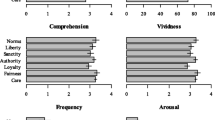Abstract
People’s moral judgments affect their judgments of intentionality for actions that succeeded by luck. This article aimed to explain that phenomenon by suggesting that people’s judgments of intentionality are driven by the underlying questions they have considered. We examined two types of questions: questions about why people act, and questions about how they succeed in acting. In a series of experiments, we found that people prefer different questions for neutral and immoral actions (Studies 1 and 2) and that asking them to think about questions they would not have preferred can change their judgments of intentionality (Study 3). These experiments suggest that neutral actions are judged to be less intentional simply because they do not motivate observers to ask questions which draw attention to the actor’s mental states. We discuss the potential application of this framework to other concepts affected by morality in surprising ways, such as causality.


Similar content being viewed by others
Notes
Knobe (personal correspondence) now rejects this view in light of the data provided in the present manuscript.
References
Adams, F., and A. Steadman. 2004. Intentional action in ordinary language: core concept or pragmatic understanding? Analysis 64(282): 173–181.
Alicke, M. 2008. Blaming badly. Journal of Cognition and Culture 8(1): 179–186.
Cova, F., Dupoux, E., and Jacob, P. forthcoming. On doing things intentionally. Mind and Language.
Guglielmo, S., and Malle, B. F. 2009. The timing of blame and intentionality: Testing the moral bias hypothesis. Unpublished manuscript, Brown University.
Knobe, J. 2003a. Intentional action and side effects in ordinary language. Analysis 63(3): 190–194.
Knobe, J. 2003b. Intentional action in folk psychology: an experimental investigation. Philosophical Psychology 16(2): 309–324.
Knobe, J. 2006. The concept of intentional action: a case study in the uses of folk psychology. Philosophical Studies 130: 203–231.
Knobe, J., and A. Burra. 2006. The folk concepts of intention and intentional action: a cross-cultural study. Journal of Cognition and Culture 6(1–2): 113–132.
Knobe, J., and B. Fraser. 2008. Causal judgment and moral judgment: Two experiments. In Moral psychology vol. 2: The cognitive science of morality: Intuition and diversity, ed. W. Sinnott-Armstrong, 441–448. Cambridge: MIT Press.
Latane, B., and J. Darley. 1970. The unresponsive bystander: Why doesn’t he help? New York City: Appleton-Century Crofts.
Leslie, A.M., J. Knobe, and A. Cohen. 2006. Acting intentionally and the side-effect effect. Psychological Science 17(5): 421–427.
Liberman, N., Y. Trope, S. McCrea, and S. Sherman. 2007. The effect of level of construal on the temporal distance of activity enactment. Journal of Experimental Social Psychology 43(1): 143–149.
Mele, A.R., and F. Cushman. 2007. Intentional action, folk judgments, and stories: sorting things out. Midwest Studies In Philosophy 31(1): 184–201.
Nadelhoffer, T. 2004. The butler problem revisited. Analysis 64(3): 277–284.
Nadelhoffer, T. 2005. Skill, luck, control, and intentional action. Philosophical Psychology 18(3): 341–352.
Nadelhoffer, T. 2006. Bad acts, blameworthy agents, and intentional actions: some problems for juror impartiality. Philosophical Explorations 9(2): 203–219.
Nichols, S., and J. Ulatowski. 2007. Intuitions and individual differences: the knobe effect revisited. Mind and Language 22(4): 346–365.
Pellizzoni, S., V. Girotto, and L. Surian. 2010. Beliefs and moral valence affect intentionality attributions: the case of side effects. Review of Philosophy and Psychology 1: 201–209.
Schaffer, J. 2007. Knowing the answer. Philosophy and Phenomenological Research 75(2): 383–403.
Sousa, P., and C. Holbrook. 2010. Folk concepts of intentional action in the contexts of amoral and immoral luck. Review of Philosophy and Psychology 1(3): 351–370.
Sripada, C. 2010. The deep self model and asymmetries in folk judgments about intentional action. Philosophical Studies 151(2): 159–176.
Sripada, C.S., and S. Konrath. 2011. Telling more than we can know about intentional action. Mind & Language 26(3): 353–380.
Stephan, E., N. Liberman, and Y. Trope. 2010. Politeness and psychological distance: a construal level perspective. Journal of Personality and Social Psychology 98(2): 268–280.
Uttich, K., and T. Lombrozo. 2010. Norms inform mental state ascriptions: a rational explanation for the side-effect effect. Cognition 116(1): 87–100.
Van Fraassen, B. 1980. The scientific image. Oxford: Oxford University Press.
Von Fintel, K. 1994. Restrictions on quantifier domains (Doctoral dissertation). University of Massachusetts, Amherst.
Young, L., F. Cushman, R. Adolphs, D. Tranel, and M. Hauser. 2006. Does emotion mediate the effect of an action’s moral status on its intentional status?: neuropsychological evidence. Journal of Culture and Cognition 6(1): 291–304.
Author information
Authors and Affiliations
Corresponding author
Rights and permissions
About this article
Cite this article
Falkenstien, K. Explaining the Effect of Morality on Intentionality of Lucky Actions: The Role of Underlying Questions. Rev.Phil.Psych. 4, 293–308 (2013). https://doi.org/10.1007/s13164-013-0135-6
Published:
Issue Date:
DOI: https://doi.org/10.1007/s13164-013-0135-6



